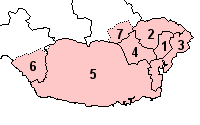List of parliamentary constituencies in South Glamorgan
The Preserved county of South Glamorgan is divided into five Parliamentary constituencies: four Borough constituencies and one County constituency. The current boundaries have been effective since the 2007 National Assembly for Wales election and the 2010 United Kingdom general election.[1]
Constituencies
| Name | 1997 to 2010 | From 2010 |
|---|---|---|
|
 |
 |
The Vale of Glamorgan constituency was formed out of the Barry constituency in 1983, with Penarth supplementing abolished Cardiff South to become Cardiff South and Penarth.
Conservative † Labour ‡
| Constituency | Electorate | Majority | Member of Parliament | Nearest opposition | Map reference above | ||
|---|---|---|---|---|---|---|---|
| Cardiff Central BC | 64,037 | 17,179 | bgcolor="Template:Labour Party (UK)/meta/color" | | Jo Stevens ‡ | bgcolor="Template:Conservative Party (UK)/meta/color" | | Meirion Jenkins † | 1 |
| Cardiff North BC | 68,438 | 6,982 | bgcolor="Template:Labour Party (UK)/meta/color" | | Anna McMorrin ‡ | bgcolor="Template:Conservative Party (UK)/meta/color" | | Mo Ali † | 2 |
| Cardiff South and Penarth BC | 78,837 | 12,737 | bgcolor="Template:Labour Party (UK)/meta/color" | | Stephen Doughty ‡ | bgcolor="Template:Conservative Party (UK)/meta/color" | | Philippa Broom † | 3 |
| Cardiff West BC | 68,508 | 10,986 | bgcolor="Template:Labour Party (UK)/meta/color" | | Kevin Brennan ‡ | bgcolor="Template:Conservative Party (UK)/meta/color" | | Carolyn Webster | 4 |
| Vale of Glamorgan CC | 76,508 | 3,562 | bgcolor="Template:Conservative Party (UK)/meta/color" | | Alun Cairns † | bgcolor="Template:Labour Party (UK)/meta/color" | | Belinda Loveluck-Edwards ‡ | 5 |
Proposed boundary changes
The Boundary Commission for Wales submitted their final proposals in respect of the Sixth Periodic Review of Westminster Constituencies (the 2018 review) in September 2018. Although the proposals were immediately laid before Parliament they were not brought forward by the Government for approval. Accordingly, they did not come into effect for the 2019 election which took place on 12 December 2019, and which was contested using the constituency boundaries in place since 2010.
Under the terms of the Parliamentary Voting System and Constituencies Act 2011, the Sixth Review was based on reducing the total number of MPs from 650 to 600 and a strict electoral parity requirement that the electorate of all constituencies should be within a range of 5% either side of the electoral quota.
On 24 March 2020, the Minister of State for the Cabinet Office, Chloe Smith, issued a written statement to Parliament setting out the Government's thinking with regard to parliamentary boundaries. They propose to bring forward primary legislation to remove the statutory obligation to implement the 2018 Boundary Review recommendations, as well as set the framework for future boundary reviews in time for the next review which is due to begin in early 2021 and report no later than October 2023. It is proposed that the number of constituencies now remains at the current level of 650, rather than being reduced to 600, while retaining the requirement that the electorate should be no more than +/- 5% from the electoral quota.[2]
See also
References
- ^ The Parliamentary Constituencies and Assembly Electoral Regions (Wales) Order 2006, OPSI website
- ^ "Update: Strengthening Democracy:Written statement - HCWS183". UK Parliament. Retrieved 2020-04-21.
